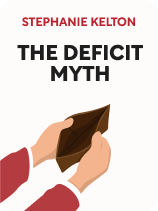

This article is an excerpt from the Shortform book guide to "The Deficit Myth" by Stephanie Kelton. Shortform has the world's best summaries and analyses of books you should be reading.
Like this article? Sign up for a free trial here .
What is a monetary sovereign? Why does Stephanie Kelton, the author of The Deficit Myth, believe monetary sovereigns can print unlimited amounts of money?
A monetary sovereign is a country that is the sole issuer of its own currency, and its currency isn’t tied to a finite object or another country’s currency. Believers of modern monetary theory such as Kelton argue this means they can never be in debt because they can always print more money.
Continue reading to learn more about monetary sovereignty and for criticism of their arguments.
The Federal Government Is Not Like a Household
Kelton objects to the way politicians often compare the federal government’s finances to that of a household.
These politicians claim that just as a family must be careful of how much it earns in income and how much it spends, so must the government keep careful watch over how much money it takes in in taxes against how much money it spends on social programs, military expenditures, and other programs.
According to this line of reasoning, the government can’t consistently spend more than it earns in taxes, or else it will wind up in the same financial straits as a household would—an endless cycle of debt, escalating borrowing costs, cash shortages, and ultimate financial ruin.
Kelton writes that while this argument sounds intuitive, practical, and reasonable, it is based on an entirely false premise. In reality, the federal government’s finances are nothing like those of a household and operate under an entirely different set of rules.
| Some commentators go a step further and note that the “government as a household” metaphor fails even on its own terms because having a negative net worth isn’t necessarily bad even for most households. For example, most households that have a home mortgage are technically underwater, financially speaking—their net debt outweighs their net assets. Yet, few would think of having a mortgage as an irresponsible or reckless thing to do, because owning a home is, in the long run, a net gain for your financial position—it is an asset that you can leverage and it builds wealth for you and your family. Similarly, some argue that public debt should be looked at as an investment or down payment on things that will ultimately make our society richer and happier, like health care, education, energy, and infrastructure. |
The Power of Monetary Sovereignty
Why doesn’t the U.S. federal government have to balance its budget like a private household? Why doesn’t it have to worry about its debt load and spending decisions the way an individual or business does?
According to Kelton and other proponents of MMT, this is because the United States is a monetary sovereign. A monetary sovereign is a country that is the sole issuer of its own currency and that does not borrow excessively in foreign currency or peg the value of its currency to something that it doesn’t directly control—like gold or another country’s currency.
Because these countries can just create money whenever they need it, they are generally unconstrained in their spending decisions, and they don’t need to balance their budgets and keep debts and deficits low—they can simply create more money and wipe the debt clean or balance the budget anytime they choose to. Thus, anytime the federal government needs more dollars to meet some obligation—like to finance a new spending bill passed by Congress or to pay the interest on the national debt—it can simply create the money at will.
Monetary sovereignty is a power that no private business, household, or individual has (nor do state or local governments). Therefore, according to Kelton, the “government as a household” analogy has no grounding in reality. Any purely fiscal constraints the federal government faces are entirely political and self-imposed.
| Hyperinflation: The Danger of Money Printing Kelton’s arguments are contested by other economists. They point to the historical examples of Zimbabwe during the 2000s and Germany during the 1920s to demonstrate that governments creating too much money with no actual economic activity to support it leads to hyperinflation—unsustainable rises in prices caused by too much money chasing too few goods. Eventually, the hyperinflation problem can spiral out of control, with prices rising astronomically within days or even hours—such that money ceases to lose all value and becomes entirely unreliable, with people reduced to bartering for basic goods. If a currency becomes too undervalued, foreign investors will refuse to deal in it, causing its value to fall even further and making it impossible for people to exchange it for other currencies—in effect, making it impossible for people to purchase goods and services from abroad. |
(Shortform note: Some argue that cryptocurrencies like Bitcoin and Ethereum could potentially undermine monetary sovereignty. Without proper oversight and regulation, the free flow of non-state-issued digital currencies would put Bitcoin miners in the currency-creation role that central bankers currently occupy. As the ratio of cryptocurrency to traditional currencies grows, state actors like central bankers and treasuries would lose the ability to exert control over the total volume of money in circulation. The problem is compounded when one considers the fact that cryptocurrencies are uniquely vulnerable to wild value fluctuations, cyber attacks, and speculative bubbles, all of which could spill over into the non-crypto, “real” economy—with central banks having little ability to exert control.)

———End of Preview———
Like what you just read? Read the rest of the world's best book summary and analysis of Stephanie Kelton's "The Deficit Myth" at Shortform .
Here's what you'll find in our full The Deficit Myth summary :
- A look at national debt through the lens of Modern Monetary Theory
- How public discourse about national debts and deficits gets the facts wrong
- Why MMT says the U.S. government could finance any program it wishes to create






